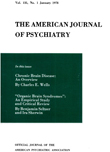THE DIAGNOSIS OF CEREBRAL ARTERIOSCLEROSIS
Abstract
Some points of interest arose out of this study:
1. Some cases of depression(8) were misdiagnosed as suffering from dementia; the impaired powers of concentration and attention found in depression presumably giving a false impression of impaired memory and of dementia.
2. The reverse mistake was much less common (2 in this series) and one can conclude that only a minority of cases (2 of 15 in this series) of cerebral arteriosclerosis will present without signs of focal neurological damage.
3. The presence or absence of peripheral or retinal arteriosclerosis had no bearing on the state of the cerebral vessels.
4. The small differences between the psychologist's and physician's assessment of dementia is probably of no significance particularly as the psychologists used many tests (e. g., Goldstein's) that are no longer in general use.
Access content
To read the fulltext, please use one of the options below to sign in or purchase access.- Personal login
- Institutional Login
- Sign in via OpenAthens
- Register for access
-
Please login/register if you wish to pair your device and check access availability.
Not a subscriber?
PsychiatryOnline subscription options offer access to the DSM-5 library, books, journals, CME, and patient resources. This all-in-one virtual library provides psychiatrists and mental health professionals with key resources for diagnosis, treatment, research, and professional development.
Need more help? PsychiatryOnline Customer Service may be reached by emailing [email protected] or by calling 800-368-5777 (in the U.S.) or 703-907-7322 (outside the U.S.).



